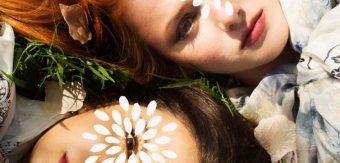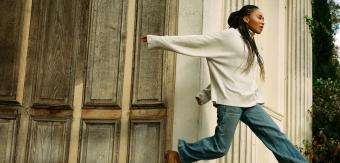Rishi Dastidar is a copywriter for ad agency archibald ingall stretton. When he's not doing that, he pretends he's a digital native at his blog Being Beta. When hes not doing that, he pretends he's a poet. And when he's not doing that, he sits on the board of the writers group 26.
Hi Rishi. Reading your biography I noticed that you attended Oxford University. Not a typical starting point for a career in the creative industry. Did you find it a rewarding experience?
Is it churlish to say ˜sort of? I’m always a bit wary of banging on about my time there, because there’s nothing worse than an Oxbridge bore. So I'll gloss over the Brideshead blues I had while there.
But equally, it's where I learnt a lot about some of the hows and whys of writing. There were some weeks that I'd be writing two essays, two features for the student newspaper, reviews too maybe up to 10,000 words a week. So you can't help but learn something. You learn how to read too, or at least give the appearance of being well read. Plus you do meet a hell of a lot of interesting people. So, on balance, yes, I was rewarded.
Given your love of proper writing, where did your leaning towards the dark arts of copywriting come from?
A couple of places. Management Trainee. Aged 42' is still my favourite ad, and it gnaws away at me sometimes knowing I'll never write anything a tenth as good as that. And Ogilvy on Advertising too. That bit about DM being his first love, and how his postcard campaign for the hotel meant all the rooms were booked out on the opening weekend the quote about him 'tasting blood' has stayed with me. I like doing work that puts bums on seats, and I've no problem with writing that sells I just don't think you necessarily need to resort to the old cliches to do so.
More practically, I did a lot of marketing for theatre companies and arts festivals at Oxford. And there was always space that needed filling in the student newspaper I was writing for, and we'd normally put in-house promotions there. So those were the first 'ads' that I wrote, not that I thought about it that way at the time. It was just more stuff to write, along with essays and whatever else I said yes to doing.
So are you the kind of writer who finds that words come easy? Or is it something you have to work hard at?
Is it arrogant to say that words come easy, but good words don't? I can write lots, badly, at speed a proper 'hack', as it were but that only gets you so far. There's a lot of just mulling stuff over in my head, waiting for a line or a headline to emerge, which I then scribble down, and hopefully it can flow from there. I have to draft on paper still I find a blank page on a screen infinitely scarier but hopefully if I've scribbled something down three, four times, found a way in, I only have to attack it a few more on screen.
I'm still very bad at re-drafting, and it's one of the things I need to force myself to do more of. (This is part of where the poetry comes in handy; rarely is a poem ever finished.) Generally, you can always chop stuff out, and generally it always makes things better.
I know you're a big admirer of David Abbott. Do you think that, what with internet, SEO and the like, the demands put upon today's copywriters have changed a lot since Abbott's time?
I saw Abbot speak at an IPA event a few weeks ago, and one of the things he said was that making good ads has always been hard. Which is true of course, but I don't think quite does justice to the fact that we now know that agencies and clients back then were operating in an age of unprecedented freedom, as nobody quite knew what they were doing or what the rules were.
We know the rules now, and that's hard to unlearn, and so in that sense the demands that writers face have changed, as agencies have changed. You have to make sure that, if you have a big, through-the-line idea, you can execute it across everything, and 'everything' could be what, up to 20 different media, social networking platforms.
Which could be headspinning if you think about it too much. But I think it is certainly do-able, especially if you've created characters. I love the way, for example, that Aleksander, the world-beating meerkat, has such a distinctive voice and that it's him in whether it's a tweet, a TV ad, a press ad. Having a character can liberate you creatively: you're asking 'how would this person speak', rather than 'how can we squeeze the message in'. For me, the former is an easier question to answer.
When we were exchanging emails about this interview you were saying that you don't think training or education in marketing is worth all that much. This struck me as interesting and also a tad divisive. What did you mean?
I have to be careful here, as I don't want to denigrate anybody's hard-won educational spurs or any august institution dedicated to raising standards.
But but but: I have a generalized, inchoate suspicion (I don't where it comes from) of the systemization of education and knowledge about marketing. It's not that I don't think some training isn't valuable. But I've yet to see or encounter any programme or text book or lecture that reinforces this fundamental truth: that what we do is an unholy mix of common sense and magic.
Instead what we have is something analogous to the way that economics has been dominated by maths, while forgetting the underlying fact that humans are messy, complicated and unpredictable. We need to be getting back to that, the idea that what we do is fundamentally more art than science, that inherently what has worked before might not work again, that testing everything to buggery is not the only way to proceed. This is why Rory Sutherland's crusade for incorporating learnings from behaviourial economics is so important it gets us back to the fact that people aren't dessicated consumption engines.
Fundamentally, marketing isn't that hard: it's telling people who want things what things are available to them, in a way that's compelling enough that they choose your thing over the other guy's. Really, how much more depth do you need than that? Only an insecure profession would answer: more.
Tell us about your workspace at Archibald Ingall Stretton. What sort of things do you have around you?
Various unexplainable oddities and kotchkes. I have: a MOO Notecard with a snap of an American edition of 'Confessions of an Advertising Man': a Mr Incredible figurine; a tiny print of Kenneth A Kerslake's 'The Sgt. Pepper Machine' from 1974; unclaimed beer and lunch vouchers given to me by Matt Morley-Brown, my boss; an apple; a squeezy Christmas pudding stress toy; a birthday card in PowerPoint a friend sent me a few years ago; plastic folders full of briefs that are current; a shelf of (as is the way of these things) books that are rarely looked at, including The Economist Style Guide and the Frieze Art Fair yearbook from last year; lots of Post-Its; two notebooks; a picture of soy sauce bottles; a pen pot; a postcard of the alphabet; and a flag with logo of one of my clients. Occupational psychotherapists, try and work out what that means.
What's the brief on your desk today?
A bill insert and some tinkering on the tone of voice guidelines for a client. A pretty normal day.
Every job has its challenges but what would you say has been your most testing writing brief so far?
Actually, I don't think it has been a commercial brief. Instead, my contribution to the 26 book Common Ground, an essay about Julian Barnes' Metroland I remember that taking forever to emerge. I was scrabbling around for weeks for any sort of peg, or hook; and it ended up being written on the back of envelopes on bus journeys, and at the departure lounge of airports. As it turned out, I was able to use some sleight of hand to turn my notes into only slightly less disorganised prose, but it seemed to work. I actually sent a draft to Barnes, and I got a lovely postcard back from him, which is amongst one of my more treasured possessions.
How have you changed from the guy that first started out in this business?
Well, subjectively, I've jumped pretty decisively, I think away from being a strategist. Moving on to the creative side has been a liberation, and I'm not sure I'd really want to sacrifice the fun that I have doing what I do.
Objectively, in nearly 10 years of doing marketing stuff, I'm not sure I've learnt too much more than that. I think not trusting to logic as much I used to is the main change; paradoxically, I've probably (my colleagues would say definitely) become more argumentative because of this.
What's your favorite and least favorite work (websites, ads, design etc) around at the moment?
Gah, I hate nominating good and bad stuff, mainly because it all moves so fast, it's all pretty ephemeral, and my short-term memory can't keep a handle on it all.
So, merely on the basis that this was the last thing I posted to my blog so I must have liked it at the time, this old film is probably the best thing I've seen recently a very dramatic demonstration of how little non-commercial space we actually have.
Can I also be really shameless and plug my sister here? She's an illustrator who trades under the name Uberpup (www.uberpup.net) and, as you can see, is the real talent in the family.
Where does your story go from here?
No idea, really. I've tried in the past to be more systematic about my career, map out the future on the back of an envelope. And invariably, when I've done that I've end up taking an option or an opportunity that I hadn't considered or dreamed of at all. I'm very happy where I am, doing what I do, and I'd like to continue doing that please.
There are some non-advertising, more writerly ambitions I'd like to hit, but I'll keep those to myself, lest I'm held to account in failing to achieve my vainglorious goals ten years hence.
John Fountain is senior writer at Avvio




